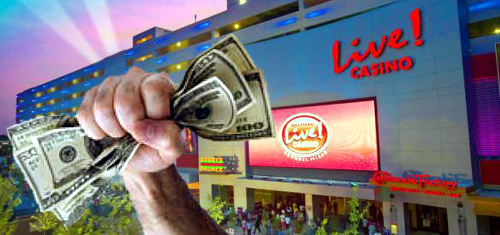 Maryland casinos have set a new monthly revenue record while topping the $100m mark for the first time.
Maryland casinos have set a new monthly revenue record while topping the $100m mark for the first time.
Figures released Thursday by Maryland Lottery and Gaming showed the state’s five casino operators reported combined gaming revenue of $103.9m in April, easily eclipsing the state’s previous best monthly tally of just under $99m last July. Table game revenue was up $7m to over $38.7m while slots rose nearly $8m to $65.1m.
April’s total is nearly 17% higher from the same month last year and also represents a significant leap from March 2016’s $98m. Maryland Lottery and Gaming director Gordon Medenica called the new record “another great milestone” for the state’s gaming operations and he looked forward to continued growth in the months to come.
As usual, the gaming gods distributed their bounty unevenly, as the market-leading Maryland Live! claimed the bulk of the proceeds. Maryland Live earned nearly $58m in April, up 13.4% year-on-year and 6% sequentially.
Horseshoe Casino Baltimore, the market’s newest casino, maintained its perennial runner-up status by earning $30.2m. However, Horseshoe Baltimore, which opened in August 2014, scored the month’s highest percentage gain, rising 31.9% year-on-year and nearly 10% from March 2016.
DETROIT CASINOS CRUCIAL TO CITY’S CONTINUED EXISTENCE
Maryland’s Medenica emphasized that the casino bounty meant “more funding for important state programs,” and figures from Detroit underscore the importance of gaming to local governments.
Chris Moyers, senior director for public affairs at US casino trade group the American Gaming Association, was recently in Detroit to talk up the contributions made by casinos to state and municipal governments. Moyers reminded Crain’s that Detroit’s three commercial casinos contributed $174.3m in tax revenue to the city in 2015, a sum that represents 16% of the municipal government’s total income.
Detroit’s three casinos enjoyed something of a turnaround last year, posting their first year-on-year revenue gain since 2011 and their best gaming revenue performance ($1.38b) since 2012’s peak of $1.42b. The bounty meant the city received $5.2m more in tax revenue than it had budgeted for the fiscal year.
Detroit declared bankruptcy in July 2013 and bureaucrats pegged the three casinos as Detroit’s most dependable source of income. In March 2014, the city breathed a sigh of relief after being told they wouldn’t have to pledge casino taxes as collateral in their ongoing debt repayment negotiations.






